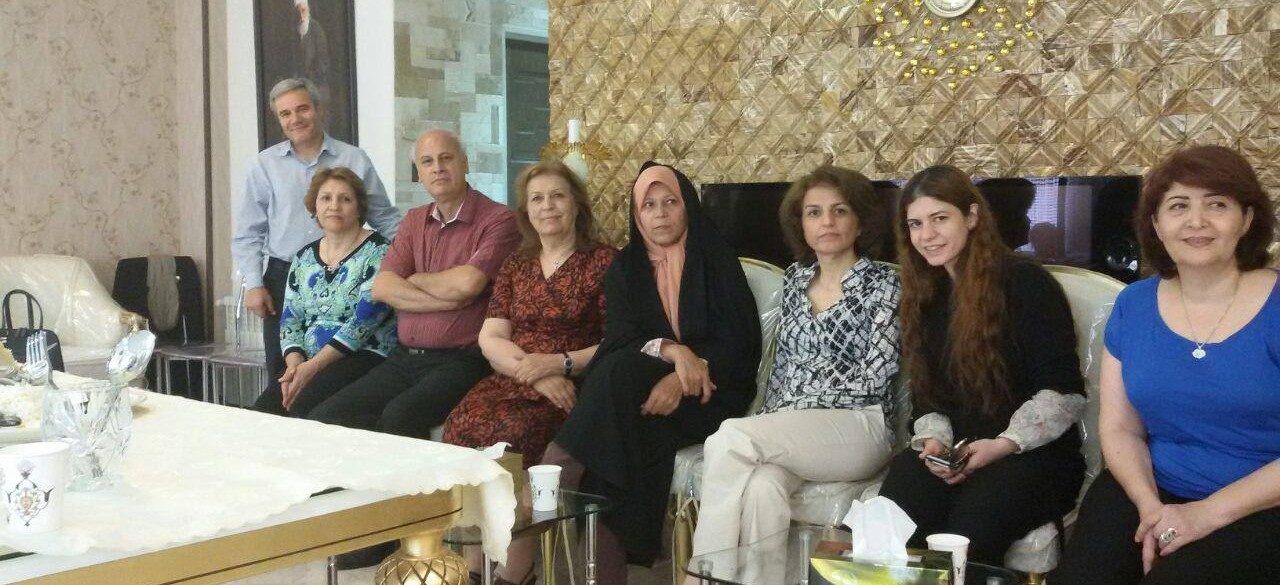Faezeh Hashemi (3rd from R), the daughter of former Iranian President Hashemi Rafsanjani, meets members of the Baha’i community in Tehran, May 2016
Iran’s authorities have sentenced four members of the Baha’i religious community for the crime of pursuing higher education.
The defendants, whose names have been withheld to protect them and their families, were each given 5-year terms for “acting against national security through the Baha’i cult organization and posting falsehoods online” after they tried to enrol or teach in universities.
The judge cited an article of the Iranian penal code which punishes anyone who establishes or directs a society which “aims to perturb the security of the country”.
Iran’s Constitution does not recognize the Baha’i faith as an official religion, and members have faced persecution and discrimination for decades, including denial of property rights, equal burial rights, and a ban on higher education.
See also Want a National ID in Iran? Then Deny Your Faith.
The judge called the defendants “activists in a secret, illegal, educational organization”: the Baha’i Institute for Higher Education, an independent, web-based university established in 1987. He condemned one defendant as a BIHE graduate who was “invited by leaders of this false Baha’i cult through email to teach classes to Baha’is and grade their work”.
The court ruling condemned the four Bahai’s for “holding classes for students…and registering their grades online with a password that was sent via e-mail”. The crime of one defendant was a channel on the Telegram messaging appliction where “all its members were Baha’is”, while others were punished for online posts about the injustice of the university ban, portrayed by the judge as “accusing the Islamic Republic of ethnic discrimination”.
The court even cited one defendant’s establishment of a day care facility: “The said person intended to carry out the plans of the false Baha’i cult to train children and youth by creating home-based day care and educate the children with the cult’s psychological programs.”
Two of the defendants had left the BIHE’s online classes when they were accepted by an Iranian university that did not require declaration of religious faith on their applications. However, they were expelled when the university officials discovered they were Baha’i.


Iran: Stop destruction of mass grave site and allow dignified burials of persecuted Baha’is
https://www.amnesty.org/en/latest/press-release/2021/04/iran-stop-destruction-of-mass-grave-site-and-allow-dignified-burials-of-persecuted-bahais/
Baha’i Cemetery in Kohgiluyeh and Boyer-Ahmad Is Destroyed
http://iranpresswatch.org/post/22398/bahai-cemetery-kohgiluyeh-boyer-ahmad-destroyed/
Germany doesn’t send its goons to murder people….this case is only one of many
Elderly Baha’i Man Brutally Murdered Amid Islamic Republic’s “Systematic Hatred” of Baha’is
https://www.iranhumanrights.org/2016/11/bahai-murder-2/
And of course iri goons are immune from punishment…
Murderers Of Baha’i Man Released On Bail
https://en.radiofarda.com/a/iran-bahai-murders-minority-rights/28551857.html
‘Threatened With Death And Rape’: Iranian Activist Back Behind Bars After Exposing Prisoner Abuse
https://www.rferl.org/a/iran-activist-gholian-prisoner-abuse/31512060.html
[Edited by moderator]
Zaghari-Ratcliffe loses court appeal: https://www.bbc.co.uk/news/world-middle-east-58940458
[Edited by moderator]
Just to point out:
Bahais are Iranian citizens and have the same following civil rights as any other Iranian citizen as according to Articles 19-41 of the constitution of the IRI:
1. They have the right to vote.
2. They have the right to work and own property.
3. They have the right to marry and associate with whom they please.
4. They have the right to social security and healthcare.
5. They have the right to join a political party or NGO.
6. They have the right to reside wherever they wish.
7. They have the right to due process and representation under the law.
8. They have the right to hold any belief.
What the 1985 law of Gozinesh does not allow religious minorities (who declare belief other than in Christianity, Judaism and Zoroastrianism) is to:
1. Run for political office. (if they specifically state they profess they are of the Bahai sect)
2. Attend university (if they specifically state they profess they are of the Bahai sect)
3. Gain employment in the government or the armed forces. (if they specifically state they profess they are of the Bahai sect)
4. Set up religious centers for mass congregation.
5. Promulgate their beliefs amongst Muslims.
6. Be buried in Muslim cemeteries.
Bahais and Yarsanis are technically Muslims as they accept the prophethood of Muhammad (pbuh) and the Qur’an as divine revelation.
Thanks, you have explained the religious discrimination of the Islamic Republic — in addition to the persecution detailed in the post — very well.
[Edited by moderator]
The restrictions against Bahais are laid out in the law.
You may regard this as “whataboutery” but Germany has banned and persecuted the religion of scientology:
“The German government does not recognize Scientology as a religion; rather, it views it as an abusive business masquerading as a religion and believes that it pursues political goals that conflict with the values enshrined in the German constitution.” https://www.tabletmag.com/sections/news/articles/scientology-is-not-a-religion
Yes. It is “whataboutery”, and a clumsy attempt to equate Baha’i with Scientology.